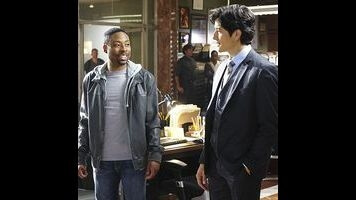Despite its source material, Rush Hour lacks identity and urgency

The first Rush Hour premiered in 1998—the same year as fellow buddy-cop template Lethal Weapon 4—and went on to gross over $200 million at the box office. The “diverse” take on the classic action-comedy formula starred Chris Tucker as the loose cannon, and martial-arts legend Jackie Chan as his by-the-books, fish-out-of-water partner. The clash of cultures in the movie spawned two successful sequels, each one more extravagant—and arguably more racist—than the last. Tucker’s piercing one-liners as Detective Carter and Chan’s engaging stunt work as Inspector Lee were a match made in blockbuster heaven.
So in true movie-to-television-adaptation style, the Rush Hour TV pilot poaches the best parts of original film’s plot, with small changes. This time around, Lee (Jon Foo) is brought to Los Angeles to avenge the “alleged death” of his little sister Kim (Jessika Van), a fellow cop who Lee literally holds back at crime busts, forcing her inevitable protest: “Big brother, why do you always hold me back?” Carter (Justin Hires) is the joke of his LAPD precinct, to the disappointment of his no-nonsense captain (Wendie Malick) and former partner Didi Diaz (Aimee Garcia). Rounding out the (all things considered) pretty talented cast is Kirk Fox as Donovan, Carter’s rival, and Page Kennedy as Gerald, Carter’s criminal cousin and unofficial informant. Henry Ian Cusick is also in the pilot, but from the moment he shows up with an American accent in Hong Kong, his role—as the Rush Hour movies were never the most surprising when it came to the plots—can be guessed from outer space. The pilot treats each scene as a necessary burden, and the viewer feels the same way.
The Rush Hour movie franchise is unfortunately downgraded for TV, right down to the casting of relative unknowns Hires and Foo as Carter and Lee. They may be aware they’re in a buddy cop show, but lack any of the chemistry that such a pairing should entail. In a different world, there’s a better version of the show that’s a buddy cop setup between Diaz (whose competence is rewarded by her character being a desk jockey) and either male lead. The only note in the Rush Hour pilot that appears to have been been taken from Tucker’s star-quality turn comes through in the Carter character: Always be loud. The good news is that Hires isn’t just doing a Chris Tucker impression; the bad news is that his version of Carter feels more like a Kevin Hart impression. At least that’s a more current comedian to crib from.
The “Asian Orlando Bloom” (as his boss describes him) that is Jon Foo comes across more as his own character as Lee, though there are bound to be outcries about the casting of an English actor of Chinese descent doing a “Chinese accent” for the series. But it’s the show’s directing style that does more harm than good for Foo’s shoe-filling. While the Rush Hour films were a showcase for Jackie Chan’s physicality and stunt work, Foo (an accomplished stuntman and martial artist) is betrayed by Jon Turteltaub’s (National Treasure) direction. Instead of properly displaying Foo’s work, Turteltaub introduces the audience to this Rush Hour’s world of slow motion and poorly shot fight scenes, robbing the show of one of its biggest opportunities to stand out. (Meanwhile, the network has currently struck creative gold with another movie-turned-procedural in Limitless, which takes chances on a weekly basis when it comes to cinematography and direction.)
While the Rush Hour film franchise may never be lauded alongside Lethal Weapon, the buddy-cop dynamic between Carter and Lee is right up there on the list with Riggs and Murtaugh. But despite the series’ impressive pedigree—the pilot is written by Scrubs’ Bill Lawrence and Cougar Town’s Blake McCormick, while the show will be run by Psych’s Steve Franks—it’s uncertain whether CBS’ Rush Hour can even live up to its small-screen equivalents, be they Crockett and Tubbs or Starsky and Hutch.